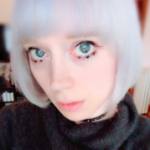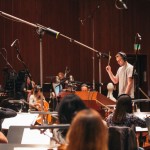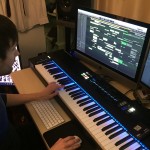Every single person I’ve met from Bemani Productions is completely amazing. Last year it was Yuichi Asami at Comic-Con, and this time it was Naoki Maeda, who has risen the ranks at Bemani to become the Dance Dance Revolution producer, overseeing the reboot of the series that will take place in 2009.
We discuss with him what he believes is a re-revolutionizing of the series as well as his thoughts on musicianship, why we don’t see more in-house Konami composers contributing to the series, and what his favorite songs are from the Bemani catalog. I really wish you guys had been there with us, as Maeda-san is one of the funniest people I’ve ever met.
Read our interview after the jump.
OSV: Okay, we’re here with Naoki Maeda from Bemani Productions. Can you please start by telling us your role at Bemani?
Maeda: I’m the producer for Dance Dance Revolution, and a music producer for the Bemani series, and a composer as well.
OSV: Ah, wow, I’m always interested when I meet a Bemani composer what their nicknames or aliases are.
Maeda: Well, my name is Naoki Maeda, so my first artist name was Naoki. This is the name I started with. Then I just started thinking of them at random from there. My other big one is Desire. I like the meaning of this word. Depending on the tempo of a given song, I’ll use a lot of different names. I write a lot of music. I think of a lot of them on the spot, like things I feel in daily life. For example, if the sky is really beautiful one day, I may use the name Blue Sky or something like that.
OSV: Well, I have to say that the name Naoki is popular among fans. A lot of the songs you’ve created under the name Naoki are quite challenging. It’s interesting with the names, to go off on a tangent. I met [Yuichi] Asami-san, and he goes under a lot of names including 2MB and U1, and it’s hard for fans to keep track of who’s who. So I wanted to ask, do you think it’s important to build a body of work under one name for recognition, or is it more important to have a more fun approach and not be tied to any one given style?
Maeda: I have both of these thoughts, actually. I try to incorporate both. That’s why there are some names that I use a lot, and others that get used only once, almost at random.
OSV: So, my biggest question is, as a fan that’s played DDR for close to 10 years… and I know you can’t tell [pointing to my stomach]. But I’m curious, because it’s always been 5th mix, 6th mix, and so on, and now what we have here at E3 is just “Dance Dance Revolution.” So why the reboot of the series?
Maeda: I’ve been working on DDR for about 10 years now. I was a sound producer, but this year I became a full-on Bemani producer. So I wanted to go back to the origins of the series. We wanted to make a new beginning for this title for the next ten years of DDR by creating this new original title, DDR for all the platforms.
OSV: So when you say, “going back to the origins,” does that mean we’re going back to the same style or feel, or is it a new beginning?
Maeda: We do want to make something completely new. We want to make a new revolution. We’re at a point where it splits into two ways, so it’s important that we do something revolutionary to make sure we take the right path. So, for DDR on the Wii, we’ve incorporated the balance board. This is a new experience that we’re providing for DDR. The shifting of the weight on the balance board or punching with the Wii remotes. While this is only in the workout of the mode, that’s just one idea for just one platform that we can do to reinvent the franchise from this year forward.
OSV: Well, the DDR series originated on the arcade, so I’m curious abut how the revolution of the balance board and the motion controls caters to the hardcore DDR fans who still want the arcade experience?
Maeda: For DDR in 2009, there is still some big news ahead, but I can’t say right now. [Editor’s Note: he announced the following day at the Konami press conference that the “surprise” was an 8-buttoned pad wih arrows on the diagnolas that basically plays like the two pad mode that was in previous games… but he demoed the Wii version of the game on the balance board and got the audience screaming with laughter. This guy rocks.]
OSV: Okay, fair enough. We’ll be looking forward to the news.
Maeda: So, as I see it, the PS2 is the standard DDR title. It will be the standard product that hardcore fans already know and love. Then for the casual player and family is the Wii title with the balance board and remote. Then there’s a third position that will be something new.
OSV: So, do you not see the Wii version as the revolution then? It’s this upcoming announcement?
Maeda: Well, using your hands and the balance board on the Wii DDR is another revolution that we’ve added to DDR.
OSV: Well, it looks to me like there are three pillars of the franchise in the works. Wii for the casual fans, PS2 for the hardcore fans, then something else.
Maeda: Just wait a little more, and stay tuned!
OSV: So these are all called DDR, there’s no distinguishing subtitle for them?
Maeda: Yeah, they are all DDR.
OSV: Do you think that will be confusing?
Maeda: In order to make it not confusing, we are considering a couple ways to distinguish the titles.
OSV: Going back to this idea of a new reboot for the series, in the past, we’ve seen that the 4th mix, 5th mix, 6th mix and so on repeat a lot of the same music. Since we’re going to see a new start for the series, will there be a large number of new songs this time around?
Maeda: Yes, this time everything will be new.
OSV: Wow, so all new songs?
Maeda: First of all, they will have a lot of new music, but the purpose of the PS2 version is so that it’s cheap and easy to buy, and is the standard DDR product. Most of it is new, but there will be some past songs as well.
OSV: So, since you moved from the sound producer role to producer, do you still get the time to write music, and are you writing music for the Wii version of DDR?
Maeda: Since I’ve become the producer, I really haven’t had the time, but I make time for it. But the fact is that the basic important part of DDR and music games is the music, so I have to take care of the music as well, and I’m still writing music for the game.
OSV: Interesting. Asami-san I believe was the producer for the Wii Hottest Party titles, and he was still able to write music for the game. Is that right?
Maeda:Asami-san is actually the director.
OSV: Ah… what’s the difference?
Maeda: The director takes care of the game in general, focusing on a single title, whereas the producer works on the franchise.
OSV: Ah, so he reports to you then?
Maeda: Yes.
OSV: So what’s his role on the Wii version then? Is he working on all three pillars of the franchise, or is he focusing on the Wii given his past experience?
Maeda: You can say he’s working on the Wii version. He’s only been producing for a couple years, and we have several teams working on different platforms, so we’re kind of restructuring right now. He’s working on other titles in the series as well.
OSV: I’m curious with the DDR on Nintendo systems in general, I remember the debut on the Gamecube was the Super Mario Dance Mix or something like that, so did you guys consider putting some cool Nintendo remixes into the Wii version of the game or something?
Maeda: Of course we have. We’ve thought about it many times, but since we’re different companies, there are of course a lot of issues that get in the way.
OSV: It would seem like they want Konami and Bemani to utilize the balance board and they want the game on the system, so it seems like you guys would have some leverage there.
Maeda: Ah, very good idea! We’ll have to think about that.
OSV: I asked Asami-san a similar question, but when you personally write DDR music, do you write a full-length song and cut it down to fit the game, or do you write a minute and a half song the first time through?
Maeda: These days I make songs that are about 5 minutes long. In the, until about two years ago, I wrote tracks to fit the game at about 2-3 minutes in length.
OSV: Yeah, it seems pretty split. Some composers prefer to write a whole song, and others to write to the game.
Maeda: They probably see it as the most efficient way to write music for the series. Then they only have to write a song that’s a minute and a half long.
OSV: So, if you had to pick your top three favorite songs from the Bemani catalogue, including DDR, Beatmania, Guitarfreaks, and whatever else, what would they be?
Maeda: Wow, that’s a really tough question. I love all the songs, especially the ones I’ve created. There are probably about 200 songs now. Hm, I’d say “Hana Ranman.”
OSV: Oh, that’s a vocal one, right? With multiple female singers?
Maeda: Well, one female singer. It was in SuperNova 1. I can’t really choose between them because there are so many. I really like “Into Your Heart,” from Hottest Party 2. So, number 3, from Hottest Party 1, would probably be “Will.”
OSV: I guess I’ll tell you my top three. Number one is “Burning Heat.”
Maeda: Ahhhh!
OSV: Then “Xenon.”
Maeda: Ohhhh! So, two songs? What about number three?
OSV: Then I don’t know! I know DDR Max and DDR Max 2 really well because I started with those ones. I don’t know. I guess I always start with “Holic” from DDR Max 2 because it has fast moves but they’re kind of easy steps, so it makes me look good.
Maeda: [Laughs] Okay!
OSV: So, I wanted to ask, is there some kind of rivalry between Bemani and Konamistyle?
Maeda: [Laughs] Why would you say that?
OSV: It just seems like there’s no cross-over between artists.
Maeda: Well, Konamistyle is the Konami online shop.
OSV: Well, for example, we’ve only seen Yamaoka-san do a couple songs for Bemani titles. We’ve never seen Higashino-san, or Miura-san, or any other in-house composers at Konami doing music for the series.
Maeda: That’s really because we’re Bemani Productions, and there are other production teams for different games. So we’re all from different departments, and we’re all sort of busy doing our own thing.
OSV: So my last couple questions. If you could have one super power, what would it be? [Laughs]
Maeda: [Laughs] The speed of writing music!
OSV: So you’d write music super fast.
Maeda: Yeah.
OSV: And if you had to pick one Bemani song to represent your life, which would it be and why?
Maeda: Ohhhhh! Good question! That’s really difficult. Hmm…
OSV: Would it be “Cutie Chaser?” [Laughs]
Maeda: [Laughs] Ah, Yuichi, ‘eh? Hm… “Max Unlimited.” I really like the word unlimited. The song is really challenging, so maybe it’s not a good song or players because the high BPM. They like the challenge, and like to try to clear it.
OSV: I sure can’t clear it.
Maeda: So, the song’s name is unlimited, and it feels that the skill of the players is unlimited. And that’s why I think I myself have to be unlimited in general. I like “Max Unlimited” not necessarily because of the music, but because my thoughts are in the title.
OSV: Well, I wanted to say it’s great meeting both of you. It’s a great pleasure to meet more people from the Bemani team, as everyone is so nice!
Maeda: Well, if you come to Japan, you can see many of us. Come to Roppongi.
OSV: I will come soon, I promise.
Maeda: Yeah, Roppongi, it’s the Japanese entertainment town. [Laughs]
OSV: I also want to say congratulations on your recent promotion, and we’re looking forward to your secret project, and thank you and we look forward to checking out the game, and good with sales on the Wii and the other versions.
Maeda: Yes, thank you very much. Thank you.
[Special thanks to Thomas Nagano from Bemani for translating]
Tags: Bemani, Dance Dance Revolution, DDR, E3 2009, Interviews, Konami, Naoki Maeda, Rhythm, Videogame









































Good interview, I too like to learn more about the mysterious Bemani division of Konami. I’m really interested to see what these new DDR’s turn out like. Reading this I jumped way ahead and pictured a DDR using the 360’s Natal, playing sort of like Eye Toy Groove but working much, much better.
I guess I’ll pony up with some of my favorite DDR songs as well with the Castlevania Medley from… Ultramix? I forget exactly which game it was in now. That one, Burning Heat as well is an all-time favorite, and probably the Ducking Hardcore Mix of It’s a Small World from Disney Mix. Yes, that’s probably a song I’ve played more than many others. And I love hearing what sounds like Donald Duck swearing.